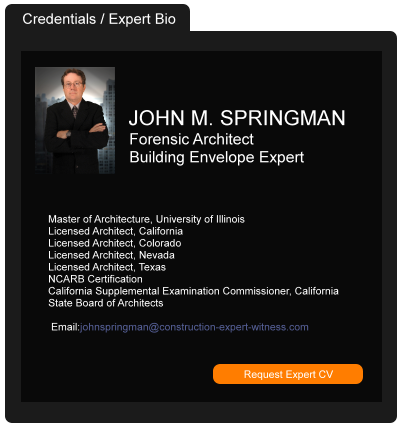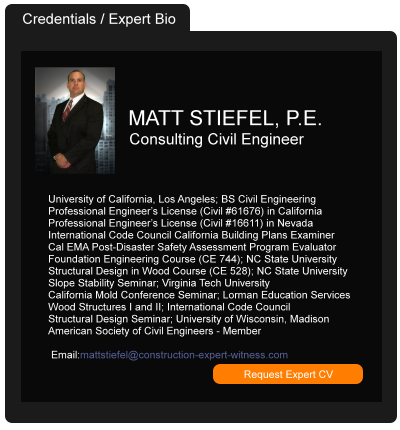BHA’s Next MCLE Seminar in San Diego on July 25th
July 02, 2014 —
Beverley BevenFlorez-CDJ STAFFThere are just three weeks remaining to sign up for Bert L. Howe & Associate’s next California MCLE seminar, UNDERSTANDING CONSTRUCTION DEFECT LITIGATION.
This activity will be presented on Friday, July 25th at noon, in BHA’s San Diego offices, located at:
402 W. Broadway
Suite 400
San Diego, CA 92101
There is no cost for attendance at this seminar and lunch will be provided.
This course has been approved for Minimum Continuing Legal Education credit by the State Bar of California Committee on MCLE in the amount of 1.0 credit hours, of which 0.0 credit hours will apply to legal ethics/professional responsibility credit. The seminar will be presented by Charlie Miller, general contractor and project manager.
Water intrusion through doors, windows and roofing systems, as well as soil and foundation-related movement, and the resultant damage associated therewith, are the triggering effects for the vast majority of homeowner complaints today and serve as the basis for most residential construction defect litigation. The graphic and animation-supported workshop/lecture activity will focus on the residential construction process from site preparation through occupancy, an examination of associated damages most often encountered when investigating construction defect claims, and the inter-relationships between the developer, general contractor, sub trades and design professionals. Typical plaintiff homeowner/HOA expert allegations will be examined in connection with those building components most frequently associated with construction defect and claims litigation.
The workshop will examine:
• Typical construction materials, and terminology associated with residential construction
• The installation process and sequencing of major construction elements, including interrelationship with other building assemblies
• The parties (subcontractors) typically associated with major construction assemblies and components
• An analysis of exposure/allocation to responsible parties.
Attendance at THE UNDERSTANDING CONSTRUCTION DEFECT LITIGATION seminar will provide the attendee with:
• A greater understanding of the terms and conditions encountered when dealing with common construction defect issues
• A greater understanding of contractual scopes of work encountered when reviewing construction contract documents
• The ability to identify, both quickly and accurately, potentially responsible parties
• An understanding of damages most often associated with construction defects, as well as a greater ability to identify conditions triggering coverage
To register for the event, please email Charlie Miller at cmiller@berthowe.com. If you have any questions, please feel free to contact Charlie at (800) 482-1822 (office) or (714) 353-1959 (cell).
Read the court decisionRead the full story...Reprinted courtesy of
“But it’s 2021!” Service of Motion to Vacate Via Email Found Insufficient by the Eleventh Circuit
June 21, 2021 —
Justin K. Fortescue - White and WilliamsWhile we are all getting used to the “new normal” of working remotely and relying on emails for almost all communications, a recent decision from the United States Court of Appeals for the Eleventh Circuit provides arbitration practitioners with a stark reminder – the “notice” requirements of the Federal Arbitration Act (FAA) will be strictly enforced and providing notice of a motion to vacate via email may not qualify as proper service.
In O'Neal Constructors, LLC v. DRT Am., LLC, 991 F.3d 1376 (11th Cir. 2021), O’Neal Constructors, LLC (O’Neal) and DRT America (DRT) entered into a contract containing an arbitration provision. Following a dispute, the parties went to arbitration and, on January 7, 2019, the panel issued an award requiring DRT to pay O’Neal a total of $1,415,193. The amount awarded to O’Neal consisted of two parts: $765,102 for the underlying contract dispute and $650,090 for reimbursement of O’Neal’s attorneys’ fees. While DRT paid O’Neal the first portion of the award, DRT refused to pay the portion that related to O’Neal’s attorneys’ fees.
On April 4, 2019, as a result of DRT’s refusal to pay O’Neal’s attorneys’ fees, O’Neal filed a motion to confirm the award in Georgia state court (which was subsequently removed to the Northern District of Georgia). The next day, in a separate action, DRT filed a motion to vacate the attorneys’ fees portion of the award and, that same night, DRT’s counsel emailed O’Neal’s counsel a “courtesy copy” of DRT’s memorandum in support of the motion to vacate. A few weeks later, on April 30, 2019 (i.e., more than three months after the award was issued), DRT served O’Neal (via U.S. Marshall) with a copy of the motion to vacate.
Read the court decisionRead the full story...Reprinted courtesy of
Justin Fortescue, White and WilliamsMr. Fortescue may be contacted at
fortescuej@whiteandwilliams.com
Pushing the Edge: Crews Carve Dam Out of Remote Turkish Mountains
July 04, 2023 —
Pam McFarland - Engineering News-RecordRugged Construction | Part Two of an ENR Series
On a cold, gray day in late March, the mountains on the drive to the Yusufeli hydroelectric dam project site in northeastern Turkey seem ominous.
With the highest of these rising more than 3,000 meters above sea level—some of them snow-capped—the jagged rock formations look stark and imposing, the type only a trained professional should attempt to cross.
Reprinted courtesy of
Pam McFarland, Engineering News-Record
Ms. McFarland may be contacted at mcfarlandp@enr.com
Read the full story... Read the court decisionRead the full story...Reprinted courtesy of
The New York Lien Law - Top Ten Things You Ought to Know
December 23, 2023 —
Ralph E. Arpajian - White and Williams LLPOver the course of my career, I have had the privilege of working with and representing numerous construction lenders (and borrowers/developers) in the financing of some of the largest commercial projects in the United States.
A number of these projects have been in New York, where one encounters the New York Lien Law (the “Lien Law”). Many of my clients, particularly those lenders, borrowers, and their counsel, located outside of New York, are often perplexed by my advice regarding the Lien Law and the loan structuring requirements which result. In the hope that it would be helpful (especially for non-New York counsel), I have compiled a “top ten” list outlining, in my view, the most critical (and most perplexing) aspects of structuring New York construction loans under the Lien Law.
Read the court decisionRead the full story...Reprinted courtesy of
Ralph E. Arpajian, White and Williams LLPMr. Arpajian may be contacted at
arpajianr@whiteandwilliams.com
When is Forum Selection in a Construction Contract Enforceable?
September 29, 2021 —
Christopher G. Hill - Construction Law MusingsIf there is one mantra that is repeated often here at Construction Law Musings, it is that your construction contract will be strictly construed and Virginia Courts will enforce the provisions as written. This rule includes forum selection clauses. For those that aren’t attorneys, this means that absent a statute to the contrary, the parties can pick the location of any litigation or arbitration by contract. However, the timing of signing that contract makes a difference as a relatively recent Eastern District of Virginia case points out.
Marathon Res. Mgmt Grp v. C. Cornell, Inc. examined what happens when work is performed by one party to the contract prior to the execution of the written contract that contains the forum selection provision. In this case, the defendant C. Cornell, Inc. obtained a default judgment in Texas for non-payment by Marathon for painting and cleaning of rooms at Texas A & M University for work invoiced on August 22, 2017, and September 11, 2017. Upon receipt of the garnishment from the Texas Court, Marathon sued C. Cornell in Virginia state court and the defendant removed the case to federal court. Marathon alleged two separate breaches of contract, the first was that C. Cornell violated the forum selection clause of a Master Services Agreement (“MSA”) executed on September 23, 2017. The second was a violation of another clause of the MSA that barred direct communication with any of Marathon’s customers. The second breach was alleged to be by virtue of the garnishment summons to one of Marathon’s customers.
Read the court decisionRead the full story...Reprinted courtesy of
The Law Office of Christopher G. HillMr. Hill may be contacted at
chrisghill@constructionlawva.com
Surety's Settlement Without Principal's Consent Is Not Bad Faith
January 05, 2017 —
Tred R. Eyerly – Insurance Law HawaiiThe Sixth Circuit found that the surety did not act in bad faith when it settled the general contractor's claims against the State of Michigan over delays on a construction project. Great Am. Ins. Co. v. E.L. Bailey & Co., 2016 U.S. App. LEXIS 20018 (6th Cir. Nov. 7, 2016).
Bailey, the general contractor, entered into a surety agreement under which Great American would issue surety bonds on behalf of Bailey in the construction of a kitchen at a State prison. Bailey, the principal, paid Great American (GAIC), the surety, to provide bonds guaranteeing contract performance to the State, the obligee or owner. GAIC provided a performance bond, guaranteeing performance of the contract work, and a payment bond, guaranteeing payments to subcontractors and suppliers. Under the agreement, Bailey would indemnify GAIC for all payments or other expenses GAIC incurred due on either bond, and would pay upon demand collateral in an amount to be determined by GAIC. In the event of an alleged breach by Bailey, the agreement assigned to GAIC all Bailey's rights under its contract with the State and well as all its claims against any party.
Bailey never finalized completion, and GAIC reached agreement with the State for another contractor to complete the project.
Read the court decisionRead the full story...Reprinted courtesy of
Tred R. Eyerly, Insurance Law HawaiiMr. Eyerly may be contacted at
te@hawaiilawyer.com
The Advantages of Virtual Reality in Construction
August 20, 2019 —
Spivey Lipsey - Construction ExecutiveVirtual realty provides an unparalleled spatial sense for visualization at a lower cost than full-scale replicas. Today, VR is being used heavily in preconstruction to align owner expectations and educate design team stakeholders. For those already employing BIM solutions, coordination can be made much more effective by leveraging existing design models with very little added cost.
As anyone who has tried a VR headset before can attest, the ability to accurately perceive spatial relationships in design cannot be replicated through traditional 2D media such as screens or paper. VR solutions also have the ability to iterate rapidly. These technologies are linked to BIM, providing real-time feedback as the design changes. This is in stark contrast to traditional full-scale mockups and offline renders, which are cumbersome and time-consuming to update with design changes.
Substantial benefits without a hefty price tag
Budget limitations and ROI are always a concern with emerging technology. Fortunately, VR comes cheaply with BIM production. These solutions are significantly less expensive than full-scale mockups and far more efficient when compared to longhand sequencing explanations and esoteric detailing of complex designs. Even the most elaborate VR setups are a fraction of overall construction cost, ranging from a few hundred to a few thousand dollars depending on the level of adoption.
Reprinted courtesy of
Spivey Lipsey, Construction Executive, a publication of Associated Builders and Contractors. All rights reserved.
Read the court decisionRead the full story...Reprinted courtesy of
Negligent Inspection Claim Against Supervising Design Professional / Consultant
August 07, 2023 —
David Adelstein - Florida Construction Legal UpdatesCan a negligence argument be created against consulting design professionals or entities that are involved in the inspection of a trade’s work? The recent opinion in Bautech USA, Inc. v. Resolve Equipment, Inc., 2023 WL 4186395 (S.D.Fla. 2023) contains an interesting fact pattern that touches upon this issue. While the case dealt with a motion to dismiss, it contains a number of issues that may be discussed in follow-up postings.
Here, a prime contractor was hired by Broward County, Florida to install offshore reef mitigation units. The contractor entered into a subcontract with a concrete fabricator to fabricate the reef mitigation units. The contractor also separately hired consultants to inspect the units. The contractor and its consultants rejected the units even after the fabricator implemented design revisions. The fabricator was then terminated and not paid for contract work plus revisions it implemented to finished units. The fabricator sued the contractor and the contractor’s consultants for non-payment under many (ten) different theories of liability claiming it was damaged to the tune of millions of dollars.
Read the court decisionRead the full story...Reprinted courtesy of
David Adelstein, Kirwin Norris, P.A.Mr. Adelstein may be contacted at
dma@kirwinnorris.com


































































